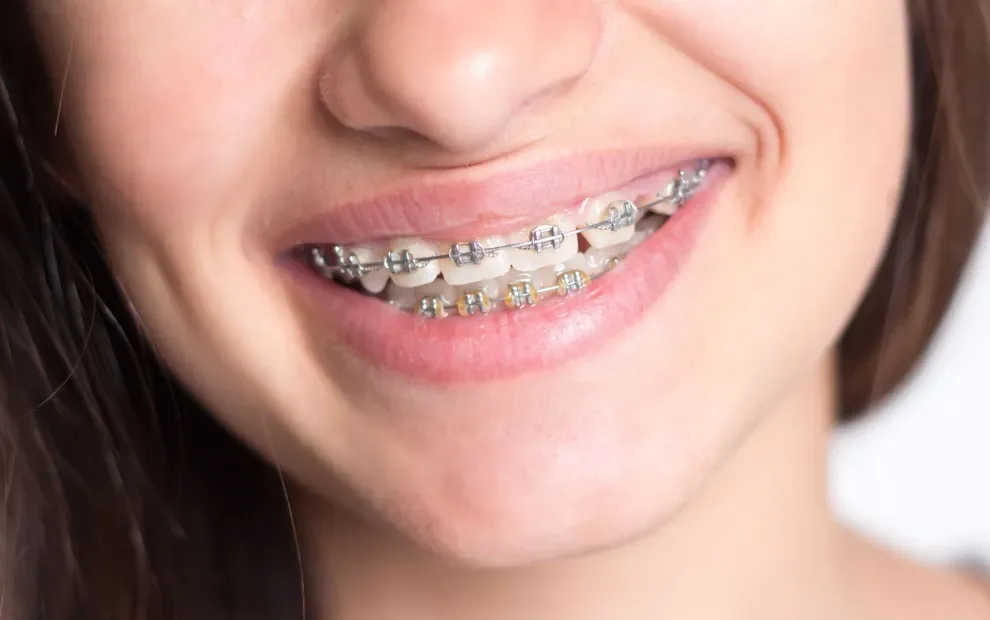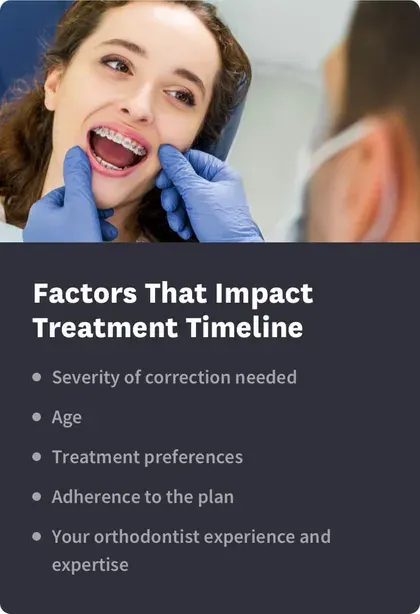How Long Do You Have to Wear Braces? Timelines

Table of Contents
- Expected Treatment Time
- Impacting Treatment Time
- Why Treatment Time Matters
- Shortening Treatment Timeline
- Are Aligners Faster
Ask several orthodontists about standard treatment times, and you'll get many different answers. Experts don't agree on one timeframe that fits everyone.
But if you opt for treatment with braces, expect to wear them for several months. You might need to wear them for several years.
Five key factors dictate how long treatment will last. Some issues you can control, although others cannot be amended.
Is There an Expected Treatment Time?
Nearly every person thinking about braces asks about treatment timelines. Unfortunately, there are no clear answers. Researchers point out that there is no official consensus on how long treatment with braces will take.
Some people need treatment for six months or less. Most people need about two years. But it’s not uncommon for people to stay in braces for three years or even longer.
5 Key Factors That Impact Treatment Time
When you meet with an orthodontist to talk about braces, treatment time will come up. You'll be told how long your therapy will last, and that estimate will be based on a variety of factors.
Your treatment may be long or short due to:

Severity. Do you have several teeth out of position? Or do you have just one or two that need a minor push? The more work your orthodontist must do to get your smile in shape, the longer you'll be in braces.
Age. Children typically have braces for two years. Adults need them for much longer.
Treatment preferences. Your orthodontist might suggest several treatment options. For example having teeth extracted or not, which would impact your time in braces.
Adherence to the plan. Braces need frequent adjustments. You must visit your orthodontist, sit in the chair, open your mouth, and allow the team to tighten your wires. Skip appointments, and you'll spend more time in braces.
Your orthodontist. People often choose dental professionals based on how careful and caring they seem. Asking about your doctor's experience and expertise might be wise too.
You can adjust your treatment times by choosing the right doctor and paying close attention to your plan. You can also ask about opportunities to shorten your time in braces. But there's little you can do to fix how old you are and how much help your teeth need.
Your time in braces is dependent on many factors, including some you can't control so expect to measure your time in months (not weeks).
Why Does Treatment Time Matter?
Your teeth are a critical part of your body. You use them to eat, drink, and swallow. Treatment can help keep them healthy, and it's reasonable to seek out care when your smile isn't ideal.
But it's not unreasonable to consider how long treatment will take. For many people, a long treatment timeline is a barrier to care. They can't afford to spend years in treatment, and they'd like to look for opportunities to make things quicker.
In studies of customer satisfaction, researchers say people are happiest when their treatment timelines are short, and they must wear few appliances while they're working on their smiles.
How Can You Help Shorten the Treatment Timeline?
Paying close attention to instructions and keeping all of your appointments is one of the best ways to ensure that you don't spend more time in braces than needed.
You can also shorten your timelines by:
Caring for your mouth. Bacteria cause your gums to swell, and when they do, they can block your teeth from moving. Brush regularly, and use fluoride rinses to keep infections away.
Protecting your appliances. A blow to the mouth can damage your braces. You'll lose critical treatment time while you wait for a repair. Use a mouth guard during sports, and avoid snacking on sharp or sticky foods.
Reporting problems quickly. Orthodontists use estimates in their work. Your mouth may move faster or slower than your team expects. If you notice something unusual, tell your doctor right away.

Are Aligners Faster?
If you don't want to spend years in braces (and few people do), consider aligners. Depending on your specific needs and the type of aligner used, this type of treatment can take anywhere from 3 to 9 months.
Aligners are clear, plastic trays that slip over your teeth and cover them from root to tip. They apply gentle pressure to encourage your teeth to take up new positions. Each week or so, you'll upgrade to a new tray that changes your teeth even more.
Aligners aren't right for every dental health problem. For example, if you have several teeth that must be moved long distances, you might need more help than aligners can provide.
But if you are right for aligners, you could see shorter treatment timelines than you would with braces. And since teeth aligners are smooth, rather than rough like braces, they're more comfortable to wear too.
